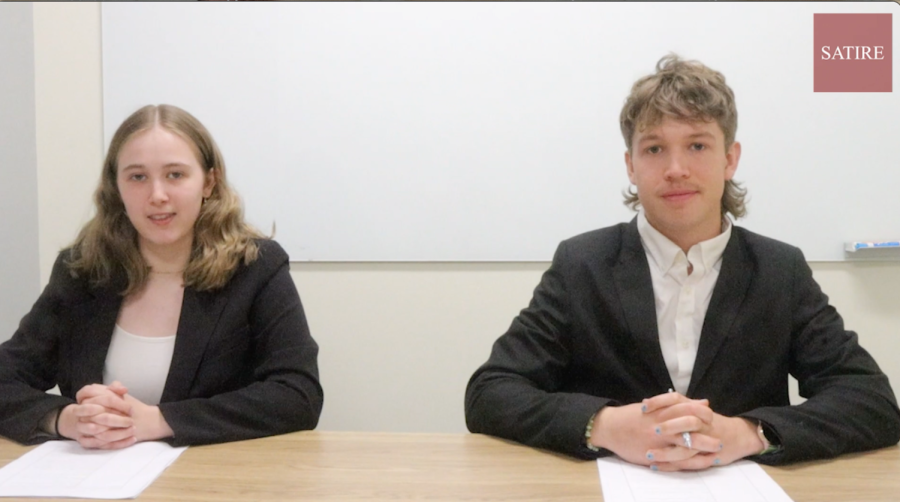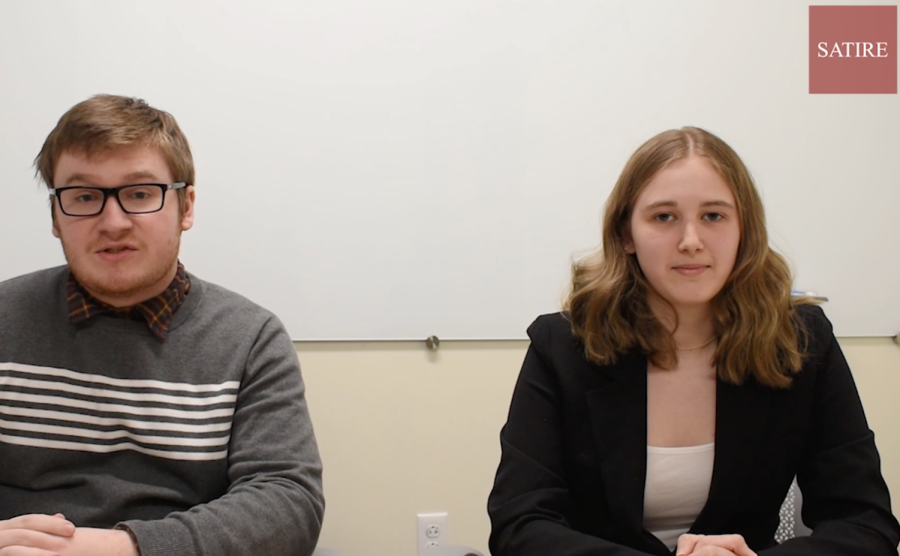[*An update was posted to the end of this story Friday after the district attorney’s office was contacted.]
There is no “magic bullet” to earn back the trust lost from the administration’s “unacceptable” mishandling of an alleged rape case, the University of Massachusetts’ dean of students told the campus community last night.
At an emotional, one-hour discussion, campus administrators were challenged Thursday with questions on how and why a student who reportedly confessed to raping a UMass alum last fall received “too light” of a punishment.
Though little new information regarding the case was announced before a crowd of around 50 last night, Dean of Students Jo-Anne T. Vanin revealed that the accused student is no longer living on campus, but is still enrolled in classes. She declined to disclose when the student moved off campus and if he did so on his own or if it was the University’s decision, but she did say it was a permanent move.
Amanda Molina, a UMass graduate student pursuing a master’s in history, was one of three female students who spoke about their own experiences with sexual assault. Two of the students said they felt their respective cases were mishandled after reporting the incidents to the UMass Police Department (UMPD) and the Dean of Students office.
“My junior year I was drugged and raped in a dorm,” said Molina. “The case in my opinion was completely mishandled. I don’t know about the University disciplinary part of it, but as far as the UMass Police Department, I felt harassed and victimized.”
“We not only train our department on how to handle [sexual assault] but also how to be sensitive to [sexual assault cases]. I’m sorry if you had a bad experience,” responded UMPD Chief Johnny Whitehead.
Erika Tabur, a kinesiology major said, “I have three friends on this campus that have been victims of sexual assault. Two of them went to both the police and the dean, and nothing came of it. I myself had a sexually abusive boyfriend, who also victimized more women on this campus. I befriended one of the girls and at different times we both went to the police.”
“I had a terrible experience with them,” she continued. “I was told verbatim by a detective ‘the guy’s a jerk, and unfortunately being a jerk isn’t against the law.’ After that, I continued to go and file a dean complaint but I didn’t follow through with it, but the other girl did and dealt with the same man I did. She was basically given the same treatment. There was a third girl victimized by the same man who was too afraid to go forward.”
Many of the speakers at the event said they were dumbfounded the University could allow what is normally a difficult offense to prosecute to receive such a light punishment, when the accused student had allegedly confessed to the accusations.
“I understand that it was a grey area, and it pretty much was our word against his,” said Tabur. “To hear about this incident in which it was confirmed that this man on campus was a rapist and nothing, nothing that really justified it came about from it … I just have to say that I hate that it took The Boston Globe to get a hold of this story to bring it forward and be acknowledged. … People want to come to a safe school, and I just don’t want UMass to be one of those schools [that covers up sexual assault cases].”
In the case in question, a UMass student confessed to raping a friend and former student in the fall and was mistakenly given a deferred suspension, according to an article by the New England Center for Investigative Reporting (NECIR) at Boston University published last week. University officials allowed him to stay on campus, a move that now has administrators reexamining UMass’ sanctioning policies and procedures.
Further details on the formation of a special commission, which will review the entire Code of Student Conduct (CSC) – something that has not been done since the mid-1990s – were announced by interim Vice Chancellor for Student Affairs and Campus Life Jean Kim. She said the commission will begin reviewing the conduct code shortly after spring break and will make recommendations back to her by November. It is expected to be a 12-person committee which will include five students, Kim said. Any recommended changes to the student conduct code would ultimately have to gain the Board of Trustees’ approval before their implementation.
Kim told the Collegian last week that the Dean of Students office has also instituted a written, formal policy to clarify that any cases classified among the most serious offenses, including sexual assault, are to be sent to the Dean of Students for review and a final decision.
There was no one individual to blame for what Kim said last week was too lenient of a punishment and a regrettable situation. She said the blame instead goes to the set up of the administrative process.
“Personally, I do not believe the sanction matched the misconduct,” Kim said.
“I can’t explain why it happened. I don’t know,” added Kim referring to the failure to have the case follow proper protocol.
Vanin said the dean who handled the case told the accused student what the sanction would be during a judicial hearing and the student signed a form agreeing to his punishment before Vanin was given the case to review.
“I think it’s a very big deal, and I wish, I wish, it was possible to go back and change it,” said Vanin of the deferred suspension.
However, the University cannot change or add to the sanctions already handed down through the student judicial system because, as Kim explained last week, there is no appeal process allowed to any person other than the accused.
“It’s hard to earn trust. And I know right now, my office has lost a lot of trust, and it is going to take the work that we do going forward and how we handle our cases to earn that trust back,” said Vanin. “There is not a magic bullet I can do or my staff can do to regain that.”
Following the alleged rape, the University reviewed past cases and said there has been no other case in which proper procedure was not followed, said Kim in.
The University has withheld some details about the case due to federal privacy laws. However, the University has repeatedly refused to confirm NECIR’s reports that the case was handled by Assistant Dean of Students Christina Willenbrock and has also declined to disclose any disciplinary action that might have or could be taken against administrators who mishandled the case.
UMass is not legally required to withhold that information, but rather it is UMass’ choice to do so and is consistent with how UMass handles what it considers personnel matters, said Director of News and Media Relations Ed Blaguszewski Tuesday.
Willenbrock reluctantly declined to comment to Collegian reporters who visited her South Hadley home Tuesday.
“The University won’t let me speak about it,” she said. “I would love to tell you all my opinions and thoughts on the matter, but I really can’t.”
University officials have thus far declined to comment on Willenbrock’s statement.
[*Below is an update posted Friday after the district attorney’s office was contacted.]
The victim in the case also reported the incident to UMPD, according to Kim. Though the victim decided against pressing charges at the time, she may still do so if she has not already.
The county’s district attorney’s office did not comment on the sexual assault case directly, but an official there said Friday that most instances of sexual assault require the victim’s consent and willingness to testify in court for the case to move towards prosecution.
But, because more details about the case remain unknown – including the names of both the accused student and the victim – the district attorney’s office was not able to confirm whether or not they have had any involvement in the case, said First Assistant District Attorney Renee Steese of Northwestern District Attorney Elizabeth D. Scheibel’s office; and therefore declined to comment directly on the matter.
Steese confirmed that student judicial records – including testimony given by a student during their judicial hearing – can be subpoenaed by the district attorney’s office for criminal prosecution.
“If we’re engaged in a prosecution, we would make every effort to obtain that record,” she said.
However, in most cases, the district attorney needs to be contacted either by local or state police, a crime lab or the victim in order to press charges, Steese said.
“For us to conduct a prosecution, there needs to be a complainant,” she said. “We don’t hear about every sexual assault. Typically, we become aware of reports of sexual abuse through the police department, communications from the crime lab regarding DNA analysis or from the victim directly calling the district attorney’s office or the state police detective unit assigned to this office.”
Steese also said that moving cases of sexual assault forward is often dependent on the victim’s desire to do so, as well as whether the victim agrees to testify.
“In the vast majority of sexual assault cases, the victim will be testifying at trial,” she said. “In a criminal prosecution, the victim is going to have to testify.”
In order to prove an accused person is guilty beyond a reasonable doubt, “you have to have someone say ‘this person did this to me,’” added Steese. “You can’t have someone just say ‘yes, I did this.’”
And, victims are often reluctant to testify in such situations because of the trauma they’ve been through and due to a desire to keep the matter private.
When considering whether or not to press charges, “The position of the victim on participating in the criminal process is given great weight by the office because of the nature of the offense,” Steese said.
For continued coverage of this story, click here.
Matt Rocheleau can be reached at [email protected]. Alyssa Creamer can be reached at [email protected]. Hannah McGoldrick can be reached at [email protected].


















reseakc • Apr 12, 2010 at 8:02 pm
The veracity of the university’s charges against this student are weak at best, since in practice there really is no minimum standard of proof for the Dean of Students’ office to find a student “responsible” for alleged charges under the student code of conduct. Technically I could walk into the Dean of Students’ office tomorrow morning and accuse another student of rape, fully aware that this is a complete lie. The student would be notified of the charges and he would be required to schedule an appointment to meet with a vice-dean, who would then present him with a description of the alleged incident, along with the university’s proposed sanction. The accused would then be told that he can either sign the paper (admitting that he was “responsible” for the charges, which the Collegian and university community has interpreted as a “confession”) and accept the proposed sanction. The student is told that if he does not accept these sanctions then he will be referred to a disciplinary board and can receive any sanction the board chooses including interim expulsion. The burden of proof on Dean’s Office is supposed to be a preponderance of evidence (51% sure he committed the offense) but in reality this isn’t practiced. The UMPD and local police routinely notify the University that a student should be charged (and they are, and found responsible) when they themselves don’t have enough probable cause to even bring charges in court. The fact that the student in this case was NOT given interim suspension/expulsion for what most people consider to be an extremely heinous crime sorta hints at how strong the Dean’s office considered the case against him to be, doesn’t it? My point is that this could just as easily be a case of revisionist hook-up-history as a legitimate crime. Before everyone starts screaming at me for blaming the victim and defending a confessed rapist, think of how 90% of people have reacted to this news story… with calls for this kid’s blood. He deserves at least one devil’s advocate.
Faye • Mar 7, 2010 at 3:56 am
Why is the press not interviewing Every Women’s Center staff? (EWC is located on campus) I recently earned my 40-hr. training for sexual assault/domestic violence prevention from a Jane Doe, Inc. affiliate and know that these services are vital for any victim’s healing.
The University dropped the ball, we all know. I highly recommend, the University review the by-laws, have an emergency meeting to change the (loop) holes, terminate the student and publicize these wonderful EWC services available. [Note: Only 11% of rape victims ever prosecute because the misconceptions by family/friends and the process with E.R. doctors, S.A.N.E. nurses and police is traumatic for a victim to continue.]
Rape is not the victim’s fault. Rape is a violent crime and is unacceptable.
IF police and faculty/staff need sensitivity training &/or safety protocol training, then find the funds and get services better for the next innocent one! (Just please do not by increase our fees AGAIN.)
It does not behoove UMass Amherst to have this filth over our heads when trying to re-brand ourselves and compete nationally.
Good luck to the hurt women and to Vanin and faculty.
Ed Cutting • Mar 5, 2010 at 12:47 pm
Larry, it is even worse than that. He was sent off to a place where unsuspecting women traveling on business often stay for the night.
And as to my Dear Dean Vanin, I want one question answered: Exactly what part of “…may pose a threat to … others” does an admitted rapist not constitute? Past behavior predicts future (a concept you kinda overlooked last fall) and someone who has raped in the past is statistically likely to go do it again. I think the EWC has statistics on that???
And if anyone has an audio recording of our exchange, I would dearly love a copy (the Collegian knows how to reach me) but I remember Vanin saying “As I said earlier, ACT has already acted.”
So as I understand it, it wasn’t an appropriate case for ACT in the fall, but now that the Globe knows about him, it became an appropriate case for the March 3rd ACT meeting; it wasn’t a concern he was living in North all fall/winter, but now the Globe knows of him, he is a threat to the community.
Ladies, there isn’t a bit of “violence against women” stuff that is going to possibly address this issue. There are very few men who truly are violent to women, everyone at UMass who needed to know about him knew that, and look what happened? A few billboards is not going to change that….
Larry Kelley • Mar 5, 2010 at 11:27 am
So he no longer lives on campus? That means Umass sent him off to an unsuspecting neighboring town. Isn’t that the way the Catholic Church once handled pedophile priests?
Thanks, Umass.